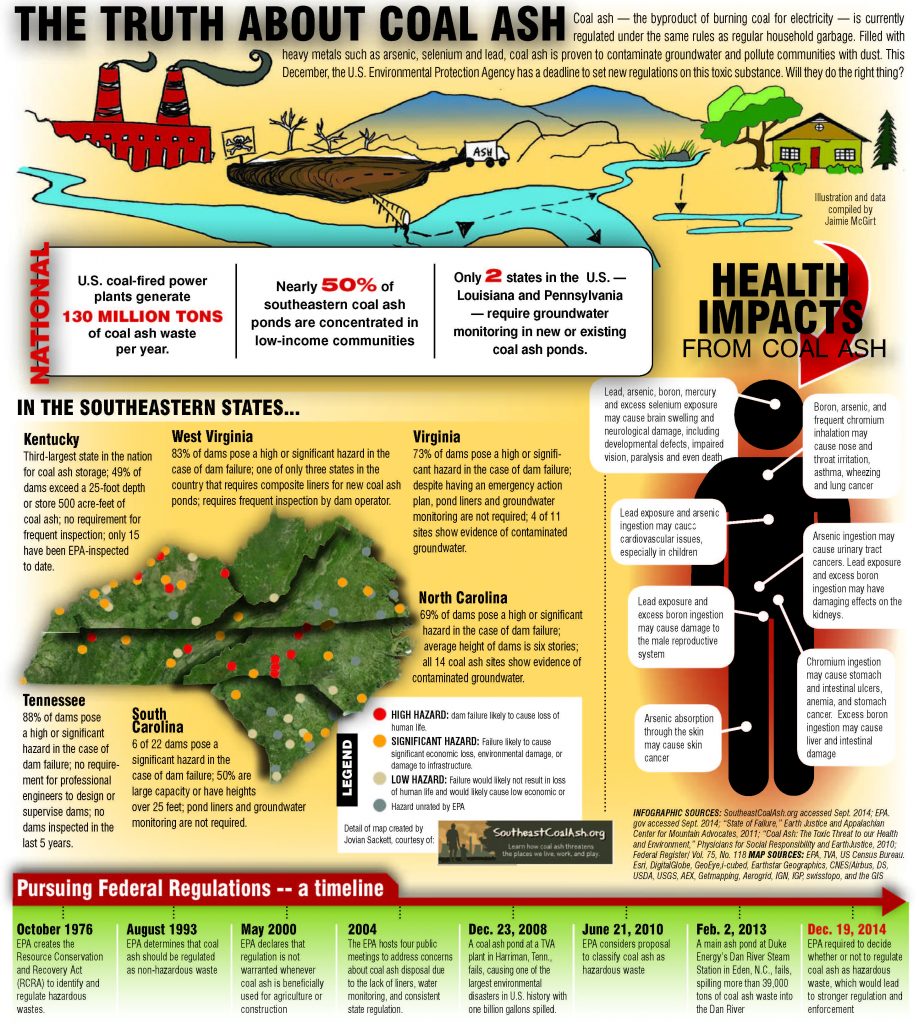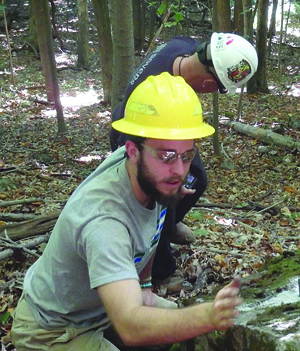Cleaning Up Coal Ash
For well over a century, power plants across the country have burned coal to generate electricity. And for just as long, leftover coal ash has been dumped in open, unlined pits near the power plant, usually located on a river or lake. Every year, U.S. power plants produce 130 million tons of coal ash, which is the second largest waste stream in the country after municipal garbage.
Coal ash concentrates the toxic heavy metals found in coal, including arsenic, mercury, lead and selenium. Stored in unlined, wet impoundments, coal ash has been leaking these toxics into our groundwater and surface waters for years. Sometimes these impoundments collapse — with disastrous results.
Yet government regulations for coal ash management are either non-existent or sparse, and there is little enforcement of the regulations that do exist. In North Carolina, this lack of oversight — and the complicity between state regulators, elected officials and Duke Energy — came to a boiling point in February 2014 when one of Duke’s coal ash impoundments spilled 39 million tons of ash into the Dan River.
Citizens living near North Carolina’s 33 coal ash impoundments — all of which have leaked — have fought for transparency from Duke and the state, and for cleanup of the pollution that threatens their property value, health and family. Their actions forced this issue into the headlines of news networks and to the forefront of environmental justice conversations in the United States.
Appalachian Voices stood with these communities as we worked for years to compel Duke Energy and the N.C. Department of Environmental Quality to excavate coal ash from all the North Carolina sites and dispose of it either in lined, dry landfills, away from waterways, or by recycling it for concrete or other uses, provided it’s done in a manner that protects public health and the environment.
On Jan. 2, 2020, North Carolina announced a historic settlement with one of the state’s most powerful corporations and polluters, Duke Energy. The settlement requires Duke to move nearly 80 million tons of toxic coal ash at six of its power plants to properly lined landfills onsite or recycle it.

Learn information about specific coal ash impoundments in the South, including health threats and safety ratings:
Additional Resources
Fact sheets, videos, links to academic research, and more
Sign Up to Act
Help us protect the health of our communities and waterways.
Latest News
Rescuing the Red Spruce Ecosystem
After a hike up a mountain, Andrea Brandon gently places a red spruce sapling into the rich West Virginia soil. Though only twelve inches tall, this small tree and others like it are a promising start to the restoration of an entire ecosystem.
The Truth About Coal Ash
Coal ash — the byproduct of burning coal for electricity — is currently less regulated than regular household garbage. Filled with heavy metals, coal ash is proven to contaminate groundwater and pollute communities with dust.
Educating Youth Takes Flight with the Snowbird Youth Center
Children beamed in Robbinsville, N.C., as the Cherokee chief cut the ribbon at the opening ceremony of the Snowbird Youth Center in July, which marked the first time since forming in 2002 that the Snowbird youth group will have a building to call their own. The new space is expected to boost efforts in preserving traditional heritage among the Eastern Band of Cherokee Indians’ Snowbird community.
Contest to Help 3 NC Families Benefit from Home Energy Efficiency
Contact: Rory McIlmoil, Energy Policy Director, 828-262-1500, rory@appvoices.org…
Davis Wax: A Spirit of Service in the Mountains
A former editorial intern with The Appalachian Voice, Davis is as comfortable writing an article about electricity transmission as he is teaching diverse groups of new volunteers the ins and outs of trail building.








